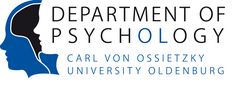Contact
Prof. Dr. S. Debener
Secretary:
Sandra Marienberg (maternity leave and parental leave)
Please use: sekretariat.psychologie@uol.de
Postal address:
Abt. Neuropsychologie
Department für Psychologie
Fakultät VI - Medizin und
Gesundheitswissenschaften
Universität Oldenburg
26111 Oldenburg
Anreise und Campusplan
Modules and module parts
Modules and Modules parts
Neuropsychology
In this module students study the structure and function of the brain (neuro-) and their relationship with behaviour (-psychology). Students learn to understand changes in thinking and behaviour that may arise from brain dysfunctions, acquire specific knowledge about the integrative brain, and learn to understand, communicate and evaluate progress in clinical practice and experimental research in neuropsychology.
Part 1: Introduction to Clinical Neuropsychology
Students study the anatomy and function of the cortical lobes, the effects of lesions, and the related neuropsychological tests. Higher functions, such as learning & memory, language and emotion, are also addressed along with aspects of plasticity and disorders such as development and recovery.
Part 2: Topics in Experimental Neuropsychology
This course focuses specifically on multisensory processes, which can be viewed as representative of the brain’s integrative operations in general. A series of discrete topics are presented, ranging from invasive single-cell recordings from animals to human brain studies of cross-modal development and plasticity.
Part 3: Research Colloquium Clinical and Experimental Neuropsychology
The focus of this module part is on the more practical aspects of neuropsychological research, and includes discussion of the research process as well as the scientific output. Topics relate to recent advances in the field and are presented either in informal talks by invited speakers or in “journal club” group discussions.
Part 4: Topics in Clinical Neuropsychology (in German)
This course is taught in German by Prof. H. Hildebrandt, a certified clinical neuropsychologist. Topics may change from term to term and cover areas such as clinical neuroanatomy, neurodegenerative diseases and dementia, among others.
Neurophysiogy
In this module students acquire specific knowledge about neurophysiology and neuroanatomy, learn the fundamental concepts of multi-channel EEG analysis, and acquire hands-on skills in using EEGLAB, an open-source software toolbox for advanced EEG analysis. This module is taught in conjunction with the Experimental Psychology Lab.
Part 2: EEG recording and analysis concepts
In this practical seminar, students become acquainted with the EEG laboratory and learn the most important steps of how to conduct an EEG experiment. Among other things, students learn how to apply and prepare an EEG cap, how to setup and record an EEG and how to behave as an experimenter.
Part 3: EEG analysis with Matlab
Students learn with hands-on practice the fundamentals of EEG analysis. Topics span the whole analysis process from initial file input and basic data structure to the final illustration of results, and include all key processing steps such as artefact processing and statistical decomposition. Students with little or no experience of Matlab programming are recommended to participate in the course “Introduction to Scientific Programming, Part 1”.
Assessment in Clinical Neuropsychology
Students acquire specific knowledge about psychological assessment and shall be able to utilize the knowledge both within a research context and within an applied context. The course covers commonly used inventories for the neuropsychological assessment of orientation and attention, verbal and visual memory, construction and executive functions. In addition to hands-on practicing use of selected inventories the course covers recent validation research. Please note that this course is offered as part of the mandatory module “Psychological Assessment and Diagnostics” and cannot be taken separately.
Computer-Controlled Experimentation
Students learn the fundamentals of data collection through hands-on practical sessions using Presentation software. The course is based around the acquisition of scripting skills, but also addresses issues such as stimulus timing and communication with EEG recording. Please note that this course is offered as part of the module “Research Methods” and cannot be taken separately.
Cognitive Developmental Neuropsychology
This seminar is part of the “Foundations of Psychology” module (PB 9). This seminar is taught in German and provides an introduction into developmental neuropsychology. This course is offered to students from educational sciences and is not suitable for students of the Masters programme Neurocognitive Psychology.
Test Diagnostics in Behavioural and Developmental Disorders during Infancy and Adolescence
This seminar is part of the “Foundations of Psychology” module (PB 9). Students learn basic aspects of test theory and get to know different psychological tests for developmental and behavioural disorders during infancy and adolescence. Among others the following clinical pictures with their corresponding psychological tests will be discussed: mental retardation, dyscalculia, dyslexia, speech and language disorders, social phobia, ADHD and aggressive behaviour.



